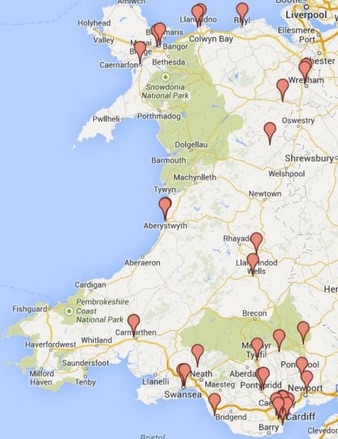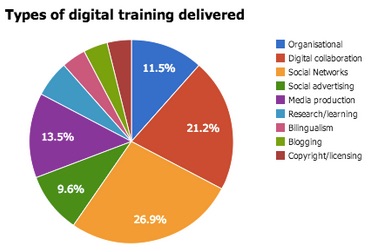
Over the six years of NativeHQ’s work, we’ve been developing our approach to delivering the best social media learning and development process for our clients. We aim to improve our clients’ own capacity to deliver good quality online social media communications that actively serve their mission.
We have developed a method that helps them to understand relationships with their networks, think through their digital strategic goals and develop skills and knowledge for turning their ideas into reality. We call it our Social Media Insights (SMI) programme. It takes place over a series of half-day sessions, which are scheduled between two weeks and a month apart.
Social Media Insights: Arts
Between 2013 and 2014, we worked with Arts Council Wales to trial this method with five arts companies at different stages in their development, working in a range of art forms across Wales in both English and Welsh. This post is about that project, and the lessons that we learnt through the work.
The SMI process starts by exploring the networks of people and organisations the company works with, who has relationships with them and how those connections impact on work. We then pin down their artistic and business aims within each set of relationships. This is the basis of a creative ideation process that helps us to develop ideas about how specific uses of digital media could improve the effectiveness of the work they do.
From this set of possibilities, we draw up a shortlist of initiatives, and the training and launch processes they need in order to start. The company picks the initiatives they want to prioritise and we plan a bespoke programme for them to take place over the remaining sessions of the programme.
NativeHQ’s work with Arts Council Wales

SMI: Arts. Applications
Arts Council Wales was interested in learning about how we support arts organisations in this way and commissioned us to deliver this service to five arts companies in Wales, and to learn from the experience.
We announced the project via social media and our call for applications received 45 applications from a variety of companies all across Wales.
There were many high quality applications and only space for five (MOSTYN, Dawns Powys Dance, Urdd Gobaith Cymru, Hijinx Theatre and Response). We then set about delivering our service to them between October 2013 and June 2014.
Responses to the programme
Here are a couple of the positive responses to the programme:
“Social Media Insights came at just the right time for Hijinx. We were in a period of change as a company, so it was the right time to stop and reflect on who are we, what we do, and how digital and social media could help us do that at a foundational level. NativeHQ have helped us to take a holistic approach to digital and social media as a company: to see digital’s potential for serving the company’s entire mission, rather than just as part of the marketing strategy.”
Vanessa Morse, Hijinx Theatre
“When we embarked on the Social Media Insights I really had not anticipated quite how the project would touch on every aspect of what we do and how we operate. Instead of some glib, generic advice on what to do / what not to do on social media, the project went so much deeper than that and required us to unpack who we are, how we do things and how we want to be and do. It was very, very bespoke and accommodated everyone’s’ skills and needs as well as the organisational needs. As a result of the SMI Arts, we now manage our projects; communicate within the team; manage our time; market ourselves; make and edit films and of course, use social media – much better than before!”
Amanda Griffkin, Dawns Powys Dance
Learnings
While writing our report to Arts Council Wales, we reflected on some of the lessons we had learnt. We are constantly learning and updating our methods and have now adapted our programme to incorporate them. Here are a few:
Blocking of essential internet services
Many arts companies, especially those working within the public sector, are struggling to access consumer web services (e.g. Facebook, Google Drive) that are being widely adopted by collaborators and audiences beyond their firewall, often because of IT security concerns. We now work with clients to help them tackle these issues within their company.
Need for strategy and the centrality of social media
Many people are still unclear about why they are using digital media and social media, which is increasingly a normal and central aspect of their network’s communications landscape. A result, they struggle for clarity about what their learning needs are, or how to manage their competing digital priorities. We start by helping them to think through their strategic priorities before we begin to plan a training programme.
Broadcast approaches
Many people take a broadcast approach to their social media presence, continually pushing information and talking at people. As this approach often fails to develop the potential of the medium, we work through alternative communications patterns, such as listening and conversations, collaborations, research and investigation. We seek to think through the possibilities of these digital patterns within their work objectives.
Leadership, sustainability and resourcing
While many organisations leave the work of social and digital media to the communications manager, digital media impacts on the whole organisation and is best tackled by a group that includes wider leadership and a breadth of team representation. While many organisations are worried by the resourcing requirements of a good social media presence, there are areas where more efficient communication skills can win time for them to make the work more sustainable.
The need for bespoke training programmes emerging from strategy
Having started with a focus on strategic aims, the training programmes that we delivered to the organisations involved in the Social Media Insights: Arts were unique to each company. Over the programme, we delivered training sessions on a very wide range of topics.

One interesting statistic was that 58% of the training topics we worked on were delivered to just one organisation, and only a minority of topics were prioritised by more than one of them. The lesson from this was that there is limited value in “general” social media training, because the training needs of organisations are unique to them, if you pay close enough attention.
We have taken encouragement from this finding that our approach of focusing on thinking about strategic priorities first with our clients will result in a bespoke programme that will accurately prioritise their development priorities.
Programme adjustments
We learnt lessons about the programme, which we delivered as an eight-session programme over eight months. During the strategic development process, we have found value in compressing the sessions so they’re closer together to concentrate the thinking and creative process. Our training programme remains one in which sessions are spaced out by at least three weeks (preferably a month), so that new learnings have time to be embedded into working practices. Our current Social Media Insight programme is now structured as follows:
The programme’s impact
In our evaluation of the programme, we asked each company if they had experienced a change in confidence in their ability to:
- understand how their work on digital platforms contributed to the company’s mission;
- develop tactics for projects and initiatives;
- how they resourced social/digital media;
- innovate and develop new approaches;
- run their own media, with existing skills and knowledge;
- evaluate their own digital work effectively by knowing what metrics mattered to them.
Across all categories and organisations, there was an increase in confidence of 45%.
Dig deeper
If you would like to know more about this programme, our approach, or how we might be able to help enable your organisation, please leave a comment, or question, or get in touch.